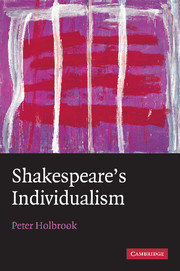17 - Freedom and self-government: The Tempest
Published online by Cambridge University Press: 06 July 2010
Summary
O, rejoice
Beyond a common joy, and set it down
With gold on lasting pillars: in one voyage
Did Claribel her husband find at Tunis,
And Ferdinand, her brother, found a wife
Where he himself was lost; Prospero, his dukedom
In a poor isle; and all of us, ourselves,
When no man was his own.
–The Tempest, V.i.206–13.Lear's speech of reconciliation with Cordelia (‘Come let's away to prison:/We two alone will sing like birds i’ th' cage') pictures an existential freedom that court life bars. Like Hamlet, Lear can look upon the world of power and place-getting (‘who's in, who's out’) with detachment – even disgust. The speech suggests there are ways of aggrandizing the self (pursuing power and influence, for example) which are actually the most frightful modes of self-forgetfulness. Lear will be freer – more himself – in a prison cell than when king. Shakespeare is often interested in such moments, when characters free themselves from conventional, specious and ultimately empty forms of self-augmentation. He casts a cold eye on the glittering appearance that distracts us from the natural, real man beneath. Richard II's puncturing remarks on ceremony (‘throw away respect,/Tradition, form, and ceremonious duty,/For you have but mistook me all this while’ (III.ii.172–4)) or Henry VI's contrast of the simple, contented life of a ‘homely’ shepherd with that of a king, ‘couched in a curious bed’ with ‘care, mistrust, and treason’ as attendants (3 Henry VI, II.v.22, 53–4), are examples of such Shakespearean unmasking.
- Type
- Chapter
- Information
- Shakespeare's Individualism , pp. 199 - 207Publisher: Cambridge University PressPrint publication year: 2010



